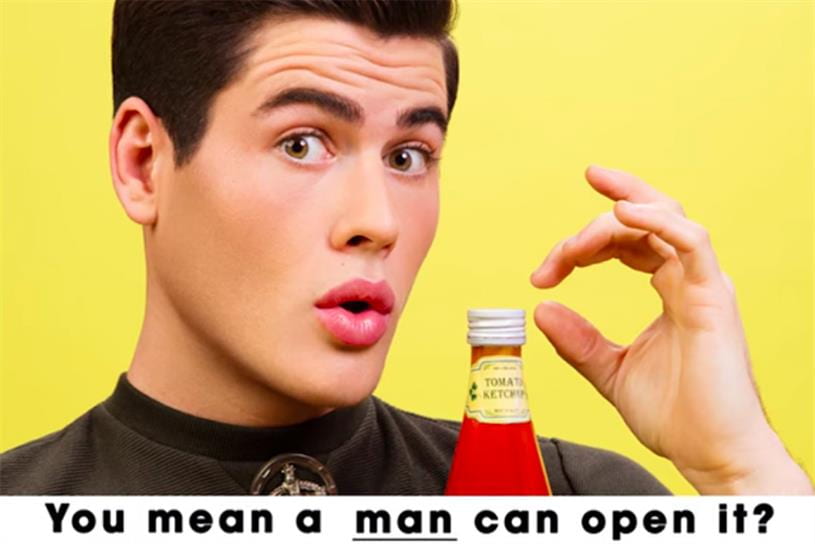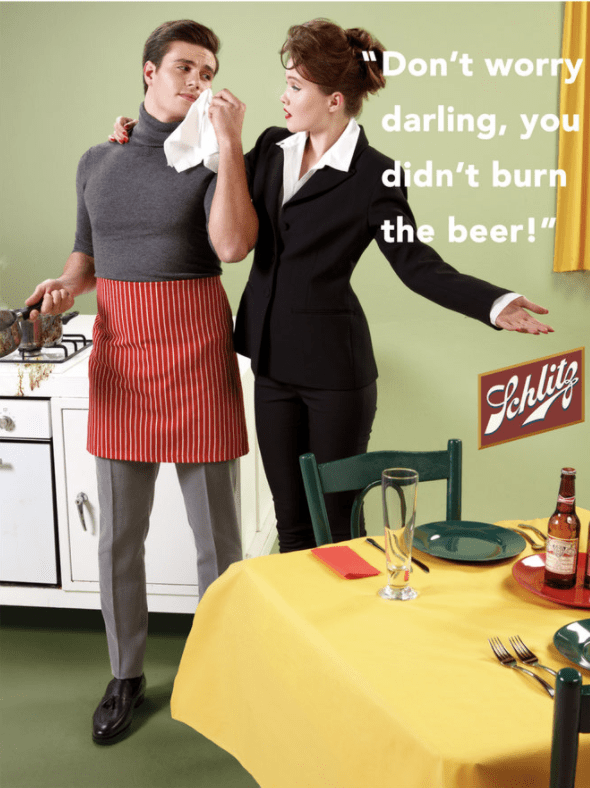So far in class, we have been analysing examples of the late 1900s advertisement in a way to explore the themes of Representation, Culture and Identity. As such, we have been looking at some of the works of a modern visual artist, Eli Rezkallah, more specifically the collection of photographs which he titles as In a parallel universe. Here are some of his works.
These examples above are parodies of the advertisement from the 1900s, rather undermining and questioning societies treatment of female gender identity. In the parodies that he makes, I found it interesting that he only touches imagery and text related to gender and thus, making everything else authentic. This not only allows to keep the familiarity of the original advertisement but also to create emphasis and transparency in the impact of the inversion of gender roles. Furthermore, these constant inversions made in an advertisement serves to almost become comical, presents a rather “mocking” and belittling attitude towards the original copy. As a result, a lot of Rezkallah’s work revolves around subverting the idea of binary thinking of gender roles and this is emphasised through the aforementioned inversion in the gender roles, where a man is instead depicted to present the domestic, inferior and feminine figure.
Why is his work on identity and representation important?
From his collection of work in In a parallel universe, it is very clear that Eli Rezkallah’s work is satirical as his work suggests his opposing attitude and subversion towards female representation and identity in the adverts. Rezkallah’s work of inverting the gender roles and recreating an advert is a clear illustration of him mocking and undermining societies depiction of binary thinking of gender roles in their adverts. This recreation not only helps us to understand the past traditional mindset of a patriarchal society but also, ironically, the idea that almost nothing has changed and the progress we have made as a society is rather minuscule. The fact that we realise the incongruity of the parody or even “understand” the implied sexualisation, domestication and inferiority of females of the original advert goes to show how deeply imbedded our binary perception of gender roles and stereotypes are. Thus, the modernised variation of the advert not only serves to ridicule societies treatment and mindset of female gender roles but also to question whether society has progressed since then. I think they have been certain improvements in some aspects of female gender roles since the past, such as female inferiority, where we see female empowerment to be more evident than ever in modern culture. But some still persist and as a matter fact, probably worsened, such as the beauty standards. Due to modern technology, more and more people are exposed to one another, more interconnected and especially accessible to almost anyone. This has led to many people being exposed to adverts, unconsciously or consciously, leading to many beauty standards being set and planted into many young minds. In a sense, I think part of Rezkallah’s modernisation of 1900s adverts serves to remind us of how societies mentality of female gender roles continues to persist in some sort of form and how it has become a part of normative culture. If anything, modern culture has made it worse. If I were to go back to the context of this original adverts, we know that they are all commercial advertisements to improve the life-styles and well-beings for both males and females. With technological advancements, more possibilities have opened up for the better or for the worse. I would think the latter as this would mean more room for society to manipulate consumers and this could imply the continuation of people consuming to meet up with societies standards.





